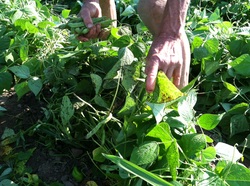 Yes, it’s true: farmers in Massachusetts have no financial incentives on either the state or federal level to donate either harvested or unharvested crops. There are no tax laws that allow a deduction for this donation. So when farmers invite BAG out to glean, you can be sure it is entirely because of their personal values that we are there. As farmer Carl Hills of Kimball Fruit Farm explained to me, and as his accountant had explained to him, deductions for the crops have already been taken in the cost of goods sold (seed, fertilizer, etc.), so deducting them again would be viewed as “double-dipping.” The latest attempt at federal legislation that would allow a deduction for the transportation of donated food took place in October 2011, when Congressman McGovern introduced H.R. 3177: The Hunger Relief Trucking Tax Credit Act (http://www.govtrack.us/congress/bills/112/hr3177) to the 112th Congress. This bill would have provided a tax credit in the form of .25 cents per mile for the transportation of donated goods to hunger relief organizations. This bill was referred to the House Ways and Means committee and died therein. In theory, this bill represented a step in the right direction and would have gone some way toward acknowledging the need for compensation to individuals who thanklessly move donated food. In actuality, however, it would not have benefited farmers at all. As I also mentioned in my previous post below (“But WHY is all this produce left in the fields?”), farm sponsored gleaning activities are financially unfeasible, and .25 cents a mile would hardly motivate a farmer to take a truck and a worker out of production for a day or even an hour. This law might have benefited your weekend gleaner, and maybe a wholesaler who could figure out how to feasibly transport donated goods as additional cargo on existing routes. That’s a good idea as well, but it doesn’t give any credit to the producer. What farmers need is a financial acknowledgment that there is additional value in the food that is leftover beyond the costs to grow it, and that the government sees this as important enough for the overall food system that tax deductions are implemented. Even if this deduction amounted to one quarter of the market value, this could really add up and help motivate farmers to make it a regular part of their business practices. Not enough to start their own gleaning programs (that would almost be business as usual, after all), but at least to call in gleaners. Some of our partner farmers have regularly donated over 10K lbs. annually to BAG. If one quarter of the market value represented .20 cents per pound, this would amount to a $2K deduction. I can’t see a farmer turning his/her nose up at that, and I am quite certain that it might push a few other farmers to pick up the phone and call us when there are 50 other tasks pressing them as well. This 10K pounds, by the way, represents almost 56,700 servings (80 grams each) of fresh produce. As we continue to see food insecurity and diet related health issues rise in eastern MA and across the country, I think that everyone can agree that there is a lot of value in figuring out how to help farmers develop systems to reliably capture their surplus. Duck Caldwell Executive Director References: http://www.govtrack.us/congress/bills/112/hr3177 Comments are closed.
|
|
|
